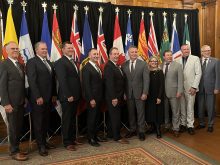The federal government’s effort to win support of farmers for its plan
to ratify the Kyoto protocol on greenhouse gas emissions is off to a
shaky start, a Manitoba farm leader told MPs last week.
Weldon Newton, president of Manitoba’s Keystone Agricultural Producers,
appeared before the House of Commons agriculture committee Nov. 26 to
argue that it is far from clear farmers will benefit directly from
Kyoto implementation.
While farmland is supposed to account for 10 million tonnes of carbon
Read Also

Canola support gets mixed response
A series of canola industry support measures announced by the federal government are being met with mixed reviews.
storing in Ottawa’s plan to meet its 240 million tonne greenhouse gas
reduction target, there is no clear commitment to send money directly
to farmers, he said.
Much of that carbon storing will happen because farmers have spent
thousands of dollars to convert to zero or minimum till.
“If you want a buy-in from hundreds of thousands of producers out
there, we have to feel part of the solution,” said Newton, appearing on
behalf of the Canadian Federation of Agriculture.
And farmers need to know that in addition to potentially higher costs,
there also are financial rewards for carbon sinks and lower greenhouse
gas emissions:
“That has to flow into my bank account.”
He said the federal government appears poised to demand international
credit for agricultural carbon sinks without paying farmers for
expensive decisions they already have made.
“This could act as a perverse incentive for producers to return to
conventional tillage.”
It would then allow them to return to no-till once Kyoto has been
implemented and credits are available.
Still, Newton said the CFA is not prepared yet to oppose Kyoto
ratification. It does not have enough information to understand if it
will be negative or positive.
“The impact of the Kyoto protocol will be a balance of positives and
negatives,” he said.
“At this point in time, it is impossible to tell which way the scale
is tipping.”
Roger Larson, president of the Canadian Fertilizer Institute, made much
the same point.
He said the Canadian fertilizer industry is a major user of natural gas
and therefore a contributor to greenhouse gas emissions.
However, it also has reduced per unit emissions and is one of the most
pollution-efficient fertilizer industries in the world.
But production will merely move to countries that are more polluting if
Canadian Kyoto-influenced rules raise natural gas prices and make the
Canadian industry less competitive, he added.
“We would like to provide you with our detailed analysis of what Kyoto
will mean for our industry and for our farmer customers,” he said. “The
truth is, we don’t know.”
It is a common complaint from critics of the government decision to
ratify Kyoto before the end of the year. Provinces, industry and the
Canadian Alliance say there are no details and much potential damage.
The government had scheduled a week to debate the agreement in the
House, but Alliance environment critic Bob Mills set a House record by
speaking through several days, effectively blocking the attempt at
debate.
The Alliance argues Kyoto is bad news for the Canadian economy.
Larson said that while the fertilizer industry has not reached a firm
conclusion because of lack of information, it is skeptical.
“It is essential that any greenhouse gas plan does not stand in the way
of continued growth in Canadian agriculture.”
Newton said farmers also oppose a plan that would increase fuel,
fertilizer or input costs. He complained that farmers have not yet been
included in Kyoto implementation planning.
“We want to be part of planning the solution and not just told what the
solution is and how we fit into it.”














